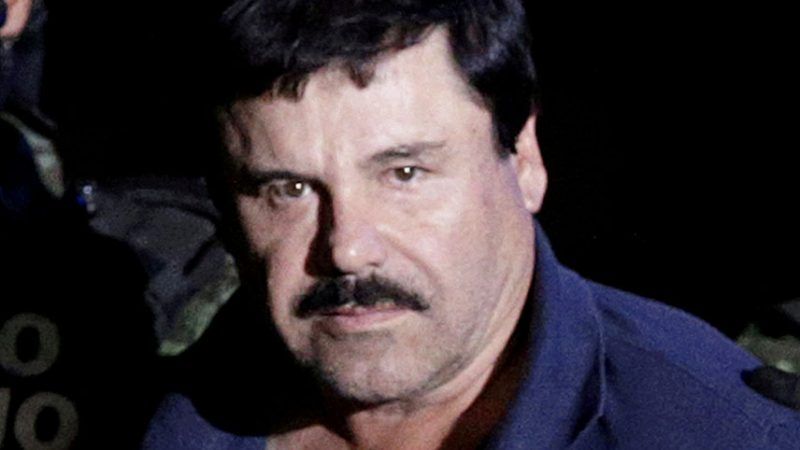Will El Chapo's Arrest Make the Drug Trade More Deadly?
Harvard economist Jeffrey Miron explains why taking out cartel kingpins demonstrates the folly of prohibition.

Mexico's most notorious drug kingpin, Joaquín "El Chapo" Guzmán, has been awaiting trial in the United States since his dramatic capture in 2016. Federal prosecutors have filed charges of drug trafficking, murder, money laundering, and kidnapping against Guzmán, who ran the notorious Sinaloa cartel for more than 40 years. El Chapo gained notoriety for his daring prison escapes, and for his controversial 2016 interview with Hollywood star Sean Penn while hiding as a fugitive from the law.
The U.S. and Mexican governments have declared Guzmán's capture a major win in the drug war. Harvard economics professor Jeffrey Miron thinks his story better demonstrates the folly of prohibition.
"When we interfere on the supply side with the drug trade by taking out kingpins and other ways, we tend to lower the prices partially because we're making the market more competitive," says Miron, who's also the head of economic studies at the libertarian Cato Institute. "Where there's demand, there's going to be supply."
The capture of kingpins doesn't just tend to make cartels more competitive in the marketplace. It can also increase violence as rival factions battle to fill the power vacuum.
A 2015 research brief conducted by Miron and his Cato colleagues Jason Lindo and Maria Padilla-Romo shows that capturing a leading drug trafficker "in a municipality increases its homicide rate by 80 percent" over a 12-month period. In neighboring municipalities, the homicide rate rises 30 percent in the six-month period after a kingpin's capture.
Over the last decade, the United States has contributed over $2 billion in money and intelligence resources to aid the Mexican government with their counternarcotics efforts, which focus on the elimination of drug cartel kingpins. In 2012, Gen. Charles Jacoby, who led the U.S. Northern Command from 2011 to 2014, admitted to Congress that removing kingpins did not have "an appreciable, positive effect" in limiting the operations and reach of Mexican drug cartels.
"In my view the best policy is to legalize everything," says Miron. "The harms come almost entirely from the prohibitions, not from the properties of the substance."
Reason spoke to Miron about the lessons to be learned from El Chapo's capture and if the Trump administration's latest calls for tougher punishment for drug dealers to combat the "terrible crisis of opioid and drug addiction" is opening a new front in the drug war.
Produced by Alexis Garcia. Cameras by Todd Krainin and Mark McDaniel.
"Cutting to the Chase" by Kai Engel is licensed under a Attribution-NonCommercial-ShareAlike License (https://creativecommons.org/licenses/by-nc-sa/4.0/) Source: http://freemusicarchive.org/music/Kai_Engel/Paradigm_Lost/02_-_Cutting_To_The_Chase Artist: http://freemusicarchive.org/music/Kai_Engel/
"Forgotten Marches" by Kai Engel is licensed under an Attribution-NonCommercial License (https://creativecommons.org/licenses/by-nc/4.0/) Source: http://freemusicarchive.org/music/Kai_Engel/Written_in_Ink/Kai_Engel_-_Written_in_Ink_-_04_Forgotten_Marches Artist: http://freemusicarchive.org/music/Kai_Engel/
"Seeger" by John Deley and the 41 Players. Source: https://www.youtube.com/audiolibrary/music
Photo Credits: Mario Guzmán/EFE/Newscom—Mexican Attorney General's Office—Pgr/Ho/Prensa International/Zuma Press/Newscom—Str/picture alliance/dpa/Newscom—José Menéndez/EFE/Newscom—Henry Romero/REUTERS/Newscom—Edgard Garrido/REUTERS/Newscom—Shawn Thew/Pool/CNP/MEGA/Newscom—Kyle Mazza/NurPhoto/Sipa USA/Newscom


Show Comments (25)